巴金英文简介
莎士比亚和巴金的资料
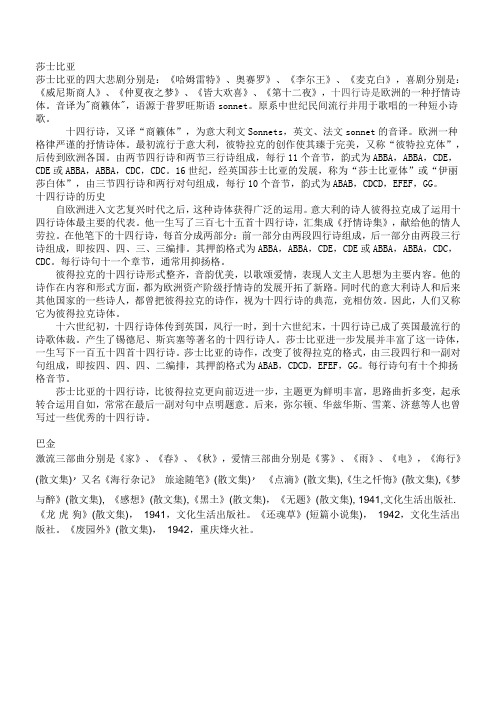
莎士比亚莎士比亚的四大悲剧分别是:《哈姆雷特》、奥赛罗》、《李尔王》、《麦克白》,喜剧分别是:《威尼斯商人》、《仲夏夜之梦》、《皆大欢喜》、《第十二夜》,十四行诗是欧洲的一种抒情诗体。
音译为"商籁体",语源于普罗旺斯语sonnet。
原系中世纪民间流行并用于歌唱的一种短小诗歌。
十四行诗,又译“商籁体”,为意大利文Sonnets,英文、法文sonnet的音译。
欧洲一种格律严谨的抒情诗体。
最初流行于意大利,彼特拉克的创作使其臻于完美,又称“彼特拉克体”,后传到欧洲各国。
由两节四行诗和两节三行诗组成,每行11个音节,韵式为ABBA,ABBA,CDE,CDE或ABBA,ABBA,CDC,CDC。
16世纪,经英国莎士比亚的发展,称为“莎士比亚体”或“伊丽莎白体”,由三节四行诗和两行对句组成,每行10个音节,韵式为ABAB,CDCD,EFEF,GG。
十四行诗的历史自欧洲进入文艺复兴时代之后,这种诗体获得广泛的运用。
意大利的诗人彼得拉克成了运用十四行诗体最主要的代表。
他一生写了三百七十五首十四行诗,汇集成《抒情诗集》,献给他的情人劳拉。
在他笔下的十四行诗,每首分成两部分:前一部分由两段四行诗组成,后一部分由两段三行诗组成,即按四、四、三、三编排。
其押韵格式为ABBA,ABBA,CDE,CDE或ABBA,ABBA,CDC,CDC。
每行诗句十一个章节,通常用抑扬格。
彼得拉克的十四行诗形式整齐,音韵优美,以歌颂爱情,表现人文主人思想为主要内容。
他的诗作在内容和形式方面,都为欧洲资产阶级抒情诗的发展开拓了新路。
同时代的意大利诗人和后来其他国家的一些诗人,都曾把彼得拉克的诗作,视为十四行诗的典范,竞相仿效。
因此,人们又称它为彼得拉克诗体。
十六世纪初,十四行诗体传到英国,风行一时,到十六世纪末,十四行诗已成了英国最流行的诗歌体裁。
产生了锡德尼、斯宾塞等著名的十四行诗人。
莎士比亚进一步发展并丰富了这一诗体,一生写下一百五十四首十四行诗。
巴金的资料简介
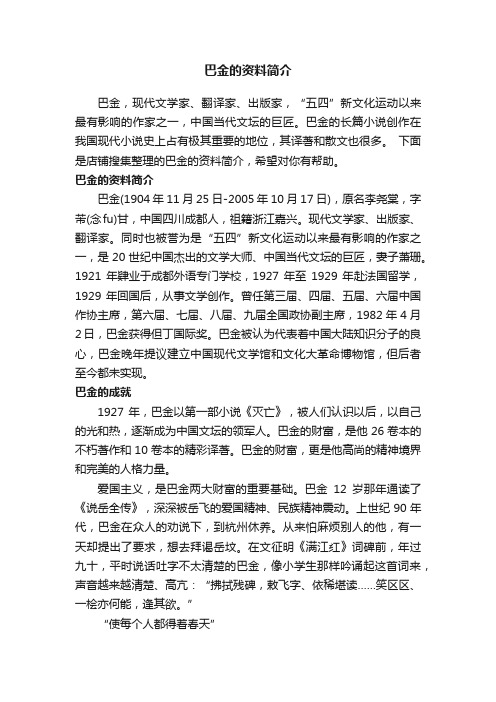
巴金的资料简介巴金,现代文学家、翻译家、出版家,“五四”新文化运动以来最有影响的作家之一,中国当代文坛的巨匠。
巴金的长篇小说创作在我国现代小说史上占有极其重要的地位,其译著和散文也很多。
下面是店铺搜集整理的巴金的资料简介,希望对你有帮助。
巴金的资料简介巴金(1904年11月25日-2005年10月17日),原名李尧棠,字芾(念fu)甘,中国四川成都人,祖籍浙江嘉兴。
现代文学家、出版家、翻译家。
同时也被誉为是“五四”新文化运动以来最有影响的作家之一,是20世纪中国杰出的文学大师、中国当代文坛的巨匠,妻子萧珊。
1921年肄业于成都外语专门学校,1927年至1929年赴法国留学,1929年回国后,从事文学创作。
曾任第三届、四届、五届、六届中国作协主席,第六届、七届、八届、九届全国政协副主席,1982年4月2日,巴金获得但丁国际奖。
巴金被认为代表着中国大陆知识分子的良心,巴金晚年提议建立中国现代文学馆和文化大革命博物馆,但后者至今都未实现。
巴金的成就1927年,巴金以第一部小说《灭亡》,被人们认识以后,以自己的光和热,逐渐成为中国文坛的领军人。
巴金的财富,是他26卷本的不朽著作和10卷本的精彩译著。
巴金的财富,更是他高尚的精神境界和完美的人格力量。
爱国主义,是巴金两大财富的重要基础。
巴金12岁那年通读了《说岳全传》,深深被岳飞的爱国精神、民族精神震动。
上世纪90年代,巴金在众人的劝说下,到杭州休养。
从来怕麻烦别人的他,有一天却提出了要求,想去拜谒岳坟。
在文征明《满江红》词碑前,年过九十,平时说话吐字不太清楚的巴金,像小学生那样吟诵起这首词来,声音越来越清楚、高亢:“拂拭残碑,敕飞字、依稀堪读……笑区区、一桧亦何能,逢其欲。
”“使每个人都得着春天”“让每个人都有住房,每个口都有饱饭,每个心都得到温暖”,巴金的心里始终珍藏着这一美好愿望。
巴金出生于成都一个封建大家庭。
仁爱的母亲,是他人生的第一个老师。
他从母亲这里懂得了爱,懂得了宽容。
巴金作文素材
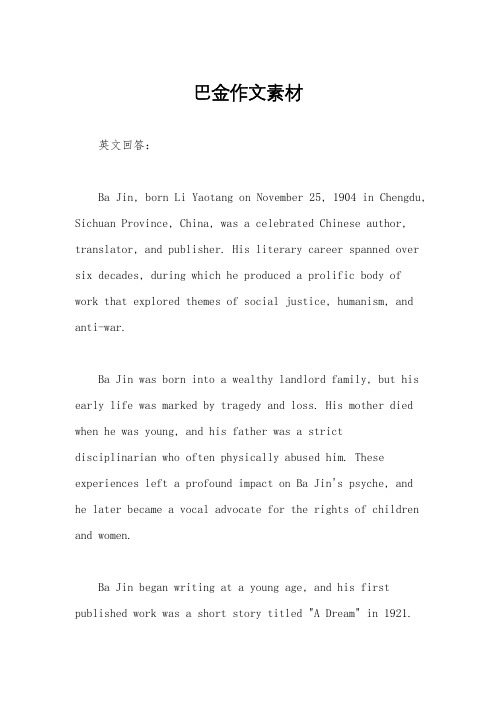
巴金作文素材英文回答:Ba Jin, born Li Yaotang on November 25, 1904 in Chengdu, Sichuan Province, China, was a celebrated Chinese author, translator, and publisher. His literary career spanned over six decades, during which he produced a prolific body of work that explored themes of social justice, humanism, and anti-war.Ba Jin was born into a wealthy landlord family, but his early life was marked by tragedy and loss. His mother died when he was young, and his father was a strictdisciplinarian who often physically abused him. These experiences left a profound impact on Ba Jin's psyche, and he later became a vocal advocate for the rights of children and women.Ba Jin began writing at a young age, and his first published work was a short story titled "A Dream" in 1921.In 1923, he moved to Shanghai, where he joined a group of young writers who were experimenting with new literary forms and ideas. Together, they founded the Literary Research Club, which became a hub for progressiveliterature in China.Ba Jin's early works were influenced by the literary realism of Lu Xun, but he gradually developed his own unique style, characterized by its lyricism and psychological depth. His most famous novels include "Mist" (1931), "Autumn" (1933), and "Family" (1933), which together form the "Torrents Trilogy." These works explore the lives of young people who struggle against social injustice and feudal constraints.During the Sino-Japanese War (1937-1945), Ba Jin actively supported the war effort and wrote numerous articles and essays condemning Japanese aggression. After the war, he continued to write and publish, but his work was often censored by the authorities. In 1958, he was labeled a "rightist" during the Anti-Rightist Campaign, and his writings were banned.Ba Jin's literary reputation was rehabilitated after the Cultural Revolution (1966-1976), and he continued to write and publish until his death in 2005. His works have been translated into more than 20 languages and have won numerous awards, including the Mao Dun Literature Prize in 1982.Ba Jin was a prolific writer who produced a diverse body of work that explored a wide range of themes. His works are characterized by their humanism, social consciousness, and lyrical beauty. He is considered one of the most important writers in modern Chinese literature.中文回答:巴金,原名李尧棠,1904年11月25日出生于四川省成都市,是中国著名的作家、翻译家和出版家。
巴金家的英文读后感

巴金家的英文读后感The Family by Ba Jin is a captivating and poignant novel that delves deep into the complexities of familial relationships and the societal pressures that shape them. As I immersed myself in this literary masterpiece, I was struck by the profound insights it offered into the human condition and the timeless struggles that transcend cultural boundaries.At the heart of the story lies the Gao family, a once-prosperous clan grappling with the winds of change sweeping through early 20th-century China. The patriarch, Old Master Gao, represents the traditional Confucian values that have long governed the family's dynamics, while his children and grandchildren find themselves torn between honoring their heritage and embracing the allure of modernity.One of the most compelling aspects of the novel is the way Ba Jin masterfully portrays the intricate web of power dynamics within the Gao household. The hierarchical structure, with its rigid expectations and unquestioned authority, serves as a microcosm of the broadersocietal norms that the characters must navigate. The tension between individual desires and familial obligations is palpable, as each character struggles to reconcile their personal aspirations with the demands of their clan.The protagonist, Zhiyuan, emerges as a particularly poignant and relatable figure. As the youngest grandson, he embodies the generational divide, torn between his love for his family and his yearning for freedom and self-expression. Zhiyuan's journey is a testament to the universal human struggle to find one's own voice and identity amidst the weight of tradition and expectation.Through the lens of the Gao family, Ba Jin masterfully explores the complex interplay between modernity and tradition, and the profound impact it has on the individual. The characters' experiences serve as a powerful metaphor for the broader societal changes unfolding in China, as the country grapples with the tension between its ancient roots and the allure of Western influence.One of the novel's most striking themes is the role of women within the patriarchal structure of the Gao household. The female characters, such as Zhiyuan's aunt and grandmother, are often relegated to the margins, their voices and agency constrained by the rigid gender norms of the time. However, Ba Jin subverts these expectations, allowing certain female characters to assert their agency andchallenge the status quo, offering a glimmer of hope for a more equitable future.The Family is not merely a work of fiction; it is a testament to the universal human experience, transcending cultural boundaries and speaking to the timeless struggles of the human condition. The novel's enduring relevance is a testament to Ba Jin's literary brilliance and his ability to capture the nuances of the human experience with such depth and poignancy.As I reflect on my reading of The Family, I am struck by the profound impact it has had on my own understanding of the complexities of familial relationships and the societal forces that shape them. The novel has challenged me to consider the ways in which our individual desires and aspirations are often at odds with the expectations and obligations of our families and our broader social context.Moreover, The Family has encouraged me to reflect on the role of tradition and modernity in shaping our identities and the ways in which we navigate the tensions between the two. Ba Jin's masterful storytelling has illuminated the universal human experience, reminding me that the struggles and triumphs of the Gao family are echoed in the lives of individuals across cultures and time periods.In conclusion, The Family by Ba Jin is a literary masterpiece thattranscends the boundaries of its cultural and historical setting. Through its rich character development, poignant themes, and masterful storytelling, the novel offers a profound and insightful exploration of the human condition. As I close the book, I am left with a deeper appreciation for the complexities of familial relationships and the enduring power of literature to illuminate the universal truths that unite us all.。
介绍巴金的英文作文

介绍巴金的英文作文英文:Bajin, whose real name is Li Yaotang, is a renowned Chinese writer and thinker. He was born in Chengdu, Sichuan Province in 1904 and died in Beijing in 2005 at the age of 101. Bajin is known for his works that reflect the struggles of the Chinese people during the early 20th century, particularly during the period of the Chinese Revolution.Bajin's most famous works include "The Family," "Jia," and "The Destruction." These works are known for theirvivid portrayal of the lives of ordinary Chinese people and their struggles against oppression and injustice. Bajin's writing is characterized by its realism, its focus onsocial issues, and its deep empathy for the suffering of the Chinese people.Bajin was also a prominent thinker and intellectual inChina. He was a member of the Communist Party of China and was active in the Chinese Revolution. He was a close friend and collaborator of Mao Zedong, the leader of the Chinese Communist Party.Bajin's legacy continues to be felt in China today. His works are still widely read and studied, and his ideas continue to inspire Chinese intellectuals and writers.中文:巴金,本名李尧棠,是著名的中国作家和思想家。
巴金简介
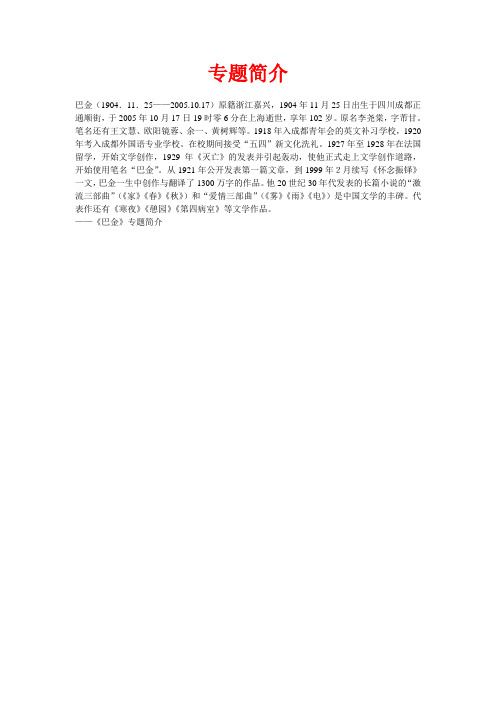
专题简介
巴金(1904.11.25——2005.10.17)原籍浙江嘉兴,1904年11月25日出生于四川成都正通顺街,于2005年10月17日19时零6分在上海逝世,享年102岁。
原名李尧棠,字芾甘。
笔名还有王文慧、欧阳镜蓉、余一、黄树辉等。
1918年入成都青年会的英文补习学校,1920年考入成都外国语专业学校。
在校期间接受“五四”新文化洗礼。
1927年至1928年在法国留学,开始文学创作,1929年《灭亡》的发表并引起轰动,使他正式走上文学创作道路,开始使用笔名“巴金”。
从1921年公开发表第一篇文章,到1999年2月续写《怀念振铎》一文,巴金一生中创作与翻译了1300万字的作品。
他20世纪30年代发表的长篇小说的“激流三部曲”(《家》《春》《秋》)和“爱情三部曲”(《雾》《雨》《电》)是中国文学的丰碑。
代表作还有《寒夜》《憩园》《第四病室》等文学作品。
——《巴金》专题简介。
巴金简介文档

巴金简介巴金(1904-2005),原名巴依奇吉帕尔,字金巴。
他是中国现代作家和文化活动家,是独立中华人民共和国的第一代作家之一。
他对中国现代文学和文化的发展做出了重要贡献。
生平巴金出生在中国新疆的乌鲁木齐市,原籍新疆维吾尔自治区伊犁哈萨克自治州。
他的家族是回族,父亲是著名的伊犁回部司法官员。
巴金从小聪明好学,热爱阅读,很早就展现出写作的才华。
1922年,巴金考入北京大学文科,开始了他的文学之路。
在校期间,他积极参与学生组织活动,对社会问题产生浓厚兴趣,并通过写作表达自己的观点。
他的作品受到了当时一些知名作家的关注,为他日后的文学发展奠定了基础。
1927年,巴金离开国内,前往法国巴黎留学。
在巴黎期间,他接触到了西方文化和思想,开始思考中国的未来和文化的发展方向。
他的一些作品也受到了西方现代思潮的影响,呈现出新的创作风格。
1949年,中华人民共和国成立后,巴金回到北京,并积极参与文化建设和写作创作。
他成为中国作家协会的重要成员,也是中国新文学运动的主要推动者之一。
在他的影响下,更多的年轻作家开始探索新的文学形式,并开展对社会问题的关注。
文学成就巴金的文学作品涵盖了小说、散文、剧本等多个领域。
他的作品充满了对社会现实的关注和对人性的思考,其风格独特而深入。
以下是他的一些代表作品:《家》这是巴金最著名的小说之一。
小说以一个普通家庭的故事展开,通过主人公吴家的变迁展现了旧社会对人性的扭曲和物质追求的无休止。
这一作品以其生动的描写和深刻的思考,深受读者喜爱,也在文学界产生了广泛的影响。
《激流三部曲》这是巴金创作的一组长篇小说,分别是《家》、《春》和《秋》。
这一系列作品以吴怀中一家三代人的命运变迁为背景,深入剖析了国家、家庭与个人之间的关系,以及社会变革对人心的冲击。
这一系列作品被誉为巴金创作的巅峰之作。
《难忘的岁月》这是巴金的自传体小说,讲述了他少年时期的经历和思考。
他通过回忆和追忆,勾勒出了那个动荡时代的风貌,并思考了个人与时代的关系。
巴金
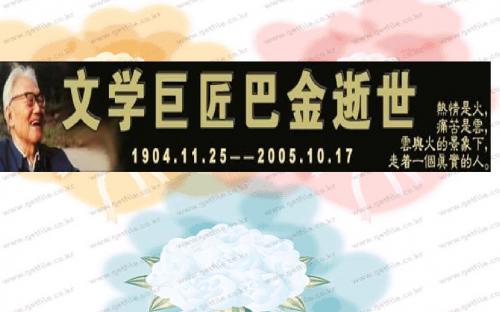
巴 金 爱 情 箴 言
-你明白我这时的心情。我的确有千言万语,却无法把它们全倾泻在纸上
……而且想到你,想到孩子,想到大家,这会给我增加勇气,我的心里永远 有你。在艰苦中,我会叫着你的名字。在任何环境下我要做一个值得你爱的 人。 -两个人在一起,用一时的情感把身体系在一个共同的命运上,就应该相 互帮助,相互谅解,相互改进自己。 -“她躺在担架上,但已经被白布床单包得紧紧的,看不到面容了。我弯 下身子,把地上那个还有点人形的白布包拍了好几下,一面哭着唤她的名字 。” -“我按期把骨灰盒接回家里。有人劝我把她的骨灰安葬,我宁愿让骨灰 盒放在我的寝室里,我感到她仍然和我在一起。她的结局将和我的结局连在 一起。” -“我进了门看到她的面容,满脑子的乌云都消散了。我有什么委屈、牢 骚,都可以向她尽情倾吐。有一个时期我和她每晚临睡前要服两粒眠尔通才 能够闭眼,可是天刚刚发白就都醒了。我唤她,她也唤我。” (摘自《怀念 萧珊》) -在巴金看来,萧珊主动爱恋自己是她的权利,是她纯洁美好心灵的自然 表露,而自己对萧珊的爱,却出于躲不过诱惑,甚至有亵渎感情的嫌疑。因 此,巴金开始仍然把萧珊当小朋友对待。
爱 情 信 ———
•
1936年的大上海,年仅32岁的巴金在文学创作和翻译两方面 已是声誉卓著。当时追求巴金的人很多,但他却没看上任何人。 在给他写信的爱国学生中有一女生写给他的信最多,落款总是“ 一个十几岁的女孩”。 这个女孩的信给巴金留下了特别的印象,他们通信达大半年 之久,却未见过面。最后,还是女孩在信中写道:“笔谈如此和 谐,为什么就不能面谈呢?希望李先生(巴金原名李芾甘)能答应 我的请求……”信中不仅约了时间、地点,还夹着一张她的照片 。
名 人 评 论 巴 金
沈从文很为巴金成为敏感人物着急,说他被两件事扰乱心灵:“一件是太偏 爱读法国革命史,一件是你太容易受身边一点现象耗费感情。前者增加你的 迷信,后者增加你的痛苦……你感情太热,理性与感情对立时,却被感情常 常占了胜利……” 曹禺说:“我怀念北平的三道门,你住的简陋的房子。那时,我仅仅是一个 不知天高地厚的无名大学生,是你在那里读了《雷雨》的稿件,放在抽屉里 近一年的稿子,是你看见这个青年还有可为,促使发表了这个剧本。你把我 介绍进了文艺界,以后每部稿子,都由你看稿、发表,这件事我说了多少遍 ,然而我说不完,还要说。因为识马不容易,识人更难。” 黄裳描述过1949年以前巴金在上海的生活:“巴金平常很少参加闲谈,他总 是一个人在楼上工作。到了吃饭或来了客人时才叫他下来……(他)披着一 件夹大衣,手里拿着一本小书,踏着有韵律的步子从楼上慢慢踱下来,从他 那浮着微笑的面颜,微醺似的神色中,可以看出他从阅读中获得的愉乐…… 巴金在我们身边,可是又不在我们身边,我们就像一群孩子那样围着他喧闹 ,当他给孩子们分发‘糖果’时,他才是活泼的、生动的。这‘糖果’就是 在他工作的出版社里出版的新书。” 萧乾称巴金为“挚友、益友和畏友”。他说:“巴金的伟大,在于敢否定 自己。”
巴金简介英语作文
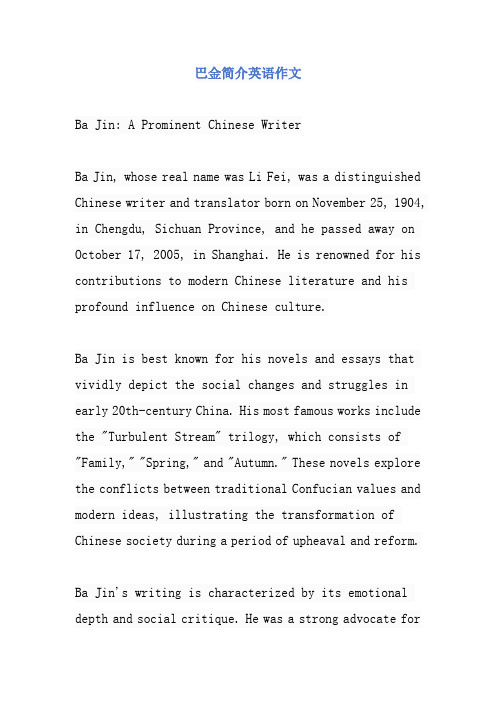
巴金简介英语作文Ba Jin: A Prominent Chinese WriterBa Jin, whose real name was Li Fei, was a distinguished Chinese writer and translator born on November 25, 1904, in Chengdu, Sichuan Province, and he passed away on October 17, 2005, in Shanghai. He is renowned for his contributions to modern Chinese literature and his profound influence on Chinese culture.Ba Jin is best known for his novels and essays that vividly depict the social changes and struggles in early 20th-century China. His most famous works include the "Turbulent Stream" trilogy, which consists of "Family," "Spring," and "Autumn." These novels explore the conflicts between traditional Confucian values and modern ideas, illustrating the transformation of Chinese society during a period of upheaval and reform.Ba Jin's writing is characterized by its emotional depth and social critique. He was a strong advocate forsocial justice and individual freedom, which is reflected in his literary works. His experiences during the May Fourth Movement and the Chinese Civil War significantly influenced his perspective and writing style.In addition to his literary achievements, Ba Jin was an active participant in various social and political movements. He was a member of the Chinese Writers' Association and played a role in promoting literature and intellectual freedom in China.Ba Jin's contributions to literature have earned him a lasting legacy as one of the most important modern Chinese writers. His works continue to be studied and admired for their insightful portrayal of human experiences and societal change.。
巴金
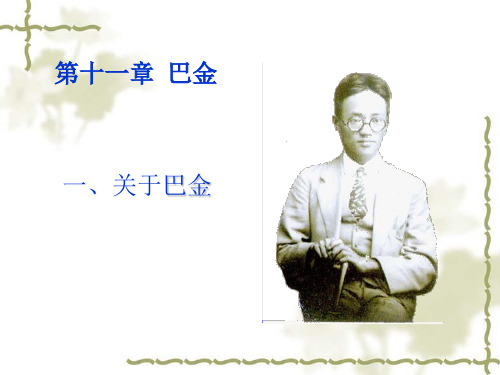
3、小说创作轨迹 时代激流与青春激情:家庭、青春、激情 构成了巴金早期小说创作的主要特征。 代表作《家》 民族悲愤与人性发掘:40年代主要写没有 英雄色彩的小人小事,写社会重压下的 “委顿的生命”,注重对人性的发掘, 由热情奔放的抒情咏叹变得悲戚而沉郁。 代表作《寒夜》。
4、巴金与青年(青年世界) 精神联系:满足青年读者的期待视野: 关注青年的命运;洋溢着激情的感情世 界、单纯热烈的格调;美丽的青春气息 (探索人生真谛与生命的价值;歌颂纯 洁的爱情、真挚的友谊、自由与幸福)
主要作品: 现代(小说):三部曲的形式 《激流三部曲》(《家》、《春》、 《秋》);《爱情三部曲》(《雾》、 《雨》、《电》);人间(地狱三部曲) (《憩园》《寒夜》《第四病室》) 当代(散文) :《随想录》(散文)
2、文学观: “文学是战斗的” 从“我控诉”到“讲真话” “把心掏给读者” “艺术的最高境界是真实、是自然,是无技 巧”
小说写了一个普通市民知识分子家庭汪 家在现实中破裂的悲剧,揭露了时代的 黑暗和腐败,为那些在黑暗中挣扎的小 人物喊出了痛苦的呼声。
2、悲剧的成因 (1)社会环境:抗战后期民生疾苦 (2)性格的悲剧:汪文宣和曾树生在性格、 追求和思想观念上的不和谐。 (3)文化的悲剧:汪母的传统道德和曾树生 的新派思想。
“无政府主义的两大思想核心,一
是反对任何形式的强权,二是强调 绝对的个性自由。”(陈思和《巴 金的意义》文学报,2003,11、27, 《新华文摘》,2004、3 )
“无政府主义是一种思想上的乌托邦,任何乌托邦 的最终目的都江堰市是不可能转化为具体政治行动 的。正因为它无法实现,所以只能通过其精神力量 融化到人们的具体日常性伦理行为中,在人生的岗 位上,点点滴滴地发挥着作用。巴金小说由30年代 的鼓吹反抗到40年代同情小人物的尊严的转换,正 反映了这一乌托邦的理想主义由实际的政治理想转 换成日常的伦理思想的轨迹。”(陈思和《巴金的 意义》,《新华文摘》,2004、3)
我的心-巴金
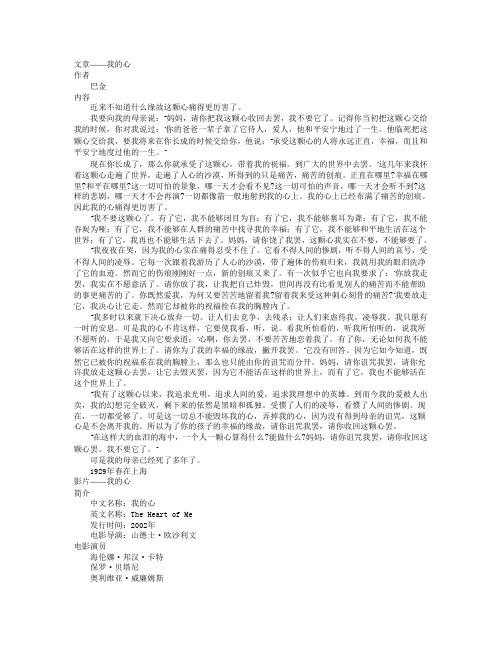
遗憾的是,电影制作方选择去创造了一个脱离于宗教和强大道德权威的世界,在那里,唯一的 衡量对与错的标尺仅仅是社会的可忍受程度,表现为Madeleine的维多利亚式的拘谨,或者是主观的 道德自治权,表现为Dinah的违反社会准则的自由,如同她画中那个裸体的女人。公允的说,影片既 没有谴责也没有宽恕人物的行为,而是选择在一个旁观者的立场上保持了缄默,从而回避了现时的 裁决。 关于宽恕
叙事镜头在第二次世界大战爆发前那些年月以及战后的某一天里来回转换。1936年,伦敦。 Rickie是一名年轻的事业有成的银行实业家,一个被紧紧围困在窒息的婚姻樊笼里的男人,外表优 雅闲适,内心阴郁;Madeleine是他的妻子,雍容美丽,闪闪发光但情感冷峻的社交界女主人。在她 的父亲死后,Madeleine邀请她的画家妹妹Dinah来到他们位于伦敦Montagu广场的房子里一同居住。
伴随着降落在伦敦街头的炮弹,空袭拉开了序幕,战争将很快席卷这片岛国,带来死亡与灾 难……
影片的最后,Rickie独自一人渐行渐远,眼神由悲恸转成释然的微笑。在他身前身后,伦敦残 破的街道延伸向远方。画面慢慢调远,从灰暗转入春日的明媚色调。绿草茵茵的草坡上,年轻的Dinah
正在放一只拖着长长飘带的风筝,笑声如银铃穿越天际。她的身影和十年后Madeleine女儿奔跑的身 影重合了,预示着饱经折磨的心灵藉由宽恕所得的最终的宁静和崭新的希望。 评论
值得肯定的是,在所有这些之下,影片向观众讲述了宽恕的重要性,以及允许怨恨的腐烂变质 将如何导致情感上的自我毁坏。宽恕的主题蕴涵在威廉.布莱克的挽歌《破碎之爱》(Broken Love) 的诗行中,这段诗句在影片里扮演了核心角色——"And throughout all eternity, I forgive you ,you forgive me."因着它,在拒绝谴责人物的放纵行为的同时,影片也揭示了行为的后果,必 须承担的责任,以及自我放纵将导向悲剧的深渊。 关于演员
文学巨匠巴金逝世Noted Chinese Literary Giant -- Ba Jin
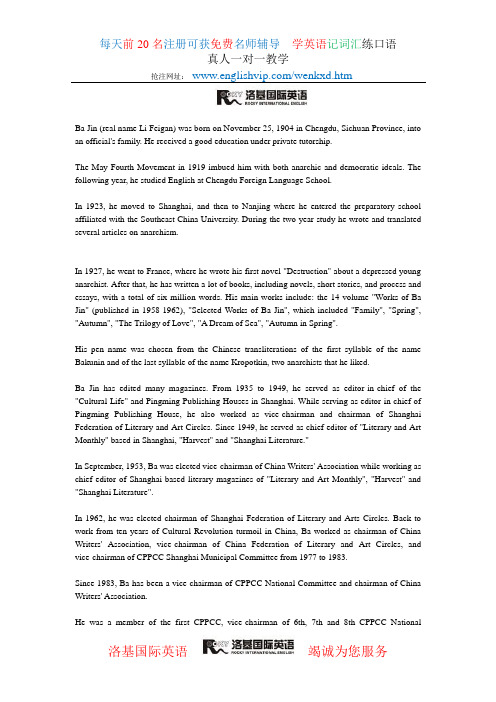
Ba Jin (real name Li Feigan) was born on November 25, 1904 in Chengdu, Sichuan Province, into an official's family. He received a good education under private tutorship.The May Fourth Movement in 1919 imbued him with both anarchic and democratic ideals. The following year, he studied English at Chengdu Foreign Language School.In 1923, he moved to Shanghai, and then to Nanjing where he entered the preparatory school affiliated with the Southeast China University. During the two-year study he wrote and translated several articles on anarchism.In 1927, he went to France, where he wrote his first novel "Destruction" about a depressed young anarchist. After that, he has written a lot of books, including novels, short stories, and process and essays, with a total of six million words. His main works include: the 14-volume "Works of Ba Jin" (published in 1958-1962), "Selected Works of Ba Jin", which included "Family", "Spring", "Autumn", "The Trilogy of Love", "A Dream of Sea", "Autumn in Spring".His pen name was chosen from the Chinese transliterations of the first syllable of the name Bakunin and of the last syllable of the name Kropotkin, two anarchists that he liked.Ba Jin has edited many magazines. From 1935 to 1949, he served as editor-in-chief of the "Cultural Life" and Pingming Publishing Houses in Shanghai. While serving as editor-in-chief of Pingming Publishing House, he also worked as vice-chairman and chairman of Shanghai Federation of Literary and Art Circles. Since 1949, he served as chief editor of "Literary and Art Monthly" based in Shanghai, "Harvest" and "Shanghai Literature."In September, 1953, Ba was elected vice-chairman of China Writers' Association while working as chief editor of Shanghai-based literary magazines of "Literary and Art Monthly", "Harvest" and "Shanghai Literature".In 1962, he was elected chairman of Shanghai Federation of Literary and Arts Circles. Back to work from ten years of Cultural Revolution turmoil in China, Ba worked as chairman of China Writers' Association, vice-chairman of China Federation of Literary and Art Circles, and vice-chairman of CPPCC Shanghai Municipal Committee from 1977 to 1983.Since 1983, Ba has been a vice-chairman of CPPCC National Committee and chairman of China Writers' Association.He was a member of the first CPPCC, vice-chairman of 6th, 7th and 8th CPPCC NationalCommittees, a deputy to 1st, 2nd, 3rd, 4th, 5th National People's Congresses (NPC) and standing committee member of 5th NPC.His works have been translated into and published in many foreign languages. He has also been given prizes and medals by Italy and the former Soviet Union for his contributions in translating and introducing to Chinese people foreign literary works and promoting Sino-foreign cultural exchange. He is also an honorary member of the American Institute of Arts and Letters.In his late years, he concentrated on editing the "Complete Works of Ba Jin" (published in 1994).Ba Jin is one of the few writers in China who live not on government pay but on royalties from their works. On his 80th birthday, he said: "I've lived on royalties all my life. It is the readers who have supported me."Although coming from a feudal family, Ba Jin is especially enlightened with his two children. Both married partners of their own choice. His daughter is now a leading member of the editorial department of a big Chinese literary magazine while his son is a rising novelist.After his wife Xiao Shan died in 1973, Ba Jin did not remarry. He is still passionately devoted to his deceased wife. He said: "When I lose my ability to work, I hope there will be several copies of fictions translated by Xiao Shan on my sickbed. After I close my eyes, please let my ashes be mixed with hers."BA Jin celebrated his 99th birthday on November 25, 2002, or rather, the literati of Shanghai and all over China, celebrated the approaching centenary of the writer, according to Chinese custom.Ba has stayed in Huadong Hospital for years, with his ability to walk and speak lost to Parkinson's disease. But the writer's position as probably the most important figure in 20th century Chinese literature makes his survival a matter of great importance.Source: “成千上万人疯狂下载。
关于巴金的简介资料

关于巴金的简介资料巴金,中国作家、翻译家、社会活动家、无党派爱国民主人士。
被誉为“二十世纪中国文学的良心”。
下面是店铺为你整理的关于巴金的简介资料,希望对你有用!巴金简介巴金(1904年11月25日—2005年10月17日),男,汉族,四川成都人,祖籍浙江嘉兴。
巴金原名李尧棠,另有笔名佩竿、极乐、黑浪、春风等,字芾甘,中国作家、翻译家、社会活动家、无党派爱国民主人士。
巴金1904年11月生在四川成都一个封建官僚家庭里,五四运动后,巴金深受新潮思想的影响,并在这种思想的影响下开始了他个人的反封建斗争。
1923年巴金离家赴上海、南京等地求学,从此开始了他长达半个世纪的文学创作生涯。
巴金在“”后撰写的《随想录》,内容朴实、感情真挚,充满着作者的忏悔和自省,巴金因此被誉为“二十世纪中国文学的良心”。
巴金人物生平人物经历1904年11月25日,出生于四川成都。
1920年,考入成都外语专门学校。
读书期间,在“五四’新潮思想影响下,加入进步青年组织“均社”。
1923年,离成都去上海、南京求学。
1925年,8月,毕业于南京东南大学附中,准备报考北京大学,因病于上海休养。
9月,参加发起无政府主义组织上海民众社并出版《民众》半月刊。
本时期翻译克鲁泡特金的一些著作。
1927年1月,赴法国巴黎求学。
在法期间,一方面大量阅读西方哲学和文学作品;另一方面,时时关心着中国,开始写作《灭亡》。
1928年12月,回上海。
从事文学编辑与创作。
1933年,任《文学季刊》编委1934年,赴日本旅行。
1935年,8月,从日本回国。
主持上海文化生活出版社编务,主编《文化生活丛刊》、《文学丛刊》、《文学生活小丛刊》等。
1937年,抗战全面爆发任《救亡日报》编委,与茅盾共同主编《呐喊》(后改名《烽火》)杂志。
1938年,2月,写完《春》。
3月,参加文协,被选为理事。
1940年七月始,辗转于昆明、重庆、成都、桂林、贵阳等地,从事抗日文化宣传活动。
德国汉学视域下的巴金作品译介与研究
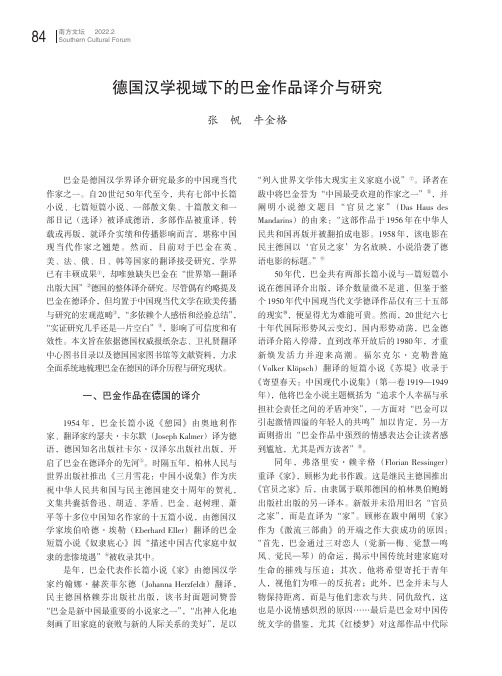
民主德国以‘官员之家’为名放映,小说沿袭了德
美、法、俄、日、韩等国家的翻译接受研究,学界
语电影的标题。”⑨
已有丰硕成果①,却唯独缺失巴金在“世界第一翻译
②
出版大国” 德国的整体译介研究。尽管偶有约略提及
巴金在德译介,但均置于中国现当代文学在欧美传播
③
与研究的宏观范畴 ,“多依赖个人感悟和经验总结”,
牛金格
“列入世界文学伟大现实主义家庭小说” ⑦ 。译者在
跋中将巴金誉为“中国最受欢迎的作家之一”⑧,并
阐 明 小 说 德 文 题 目 “ 官 员 之 家 ”(Das Haus des
Mandarins) 的由来:“这部作品于 1956 年在中华人
民共和国再版并被翻拍成电影。1958 年,该电影在
现当代作家之翘楚。然而,目前对于巴金在英、
义”,并称誉“巴金是民国时期知名作家中唯一敢
站出来,对中国当代文学现状发表令人瞩目的评论
且毫不妥协的勇者……而他正是凭借毫无保留的自
我批判与毫不妥协的态度赢得年轻读者与青年作家
的喜爱与敬重”。略显遗憾的是,为便于德国读者
理解,编译者对该作进行了删减,并根据主题重新
社出版 ,“巴金的初衷是创作一部像左拉 《萌芽》
出版宣传热身。
的三部作品》,评价“ 《砂丁》 是巴金跳脱自己熟悉
编 《〈结婚〉:20 世纪中国短篇小说集》,收录鲁
的资产阶级环境,转而迈向无产阶级工人世界的一
迅、叶圣陶、巴金、茅盾、赵树理、王蒙与老舍七
次尝试,是向批判社会的现实主义致敬的一部作
位作家的十三篇短篇小说 (其中,包括她亲自翻译
周刊》(Die Zeit) 发表 《哭泣与斗争:中国作家巴金
无疑让德国读者看到了一个古老中国的衰落,青春
介绍巴金的一生英语作文
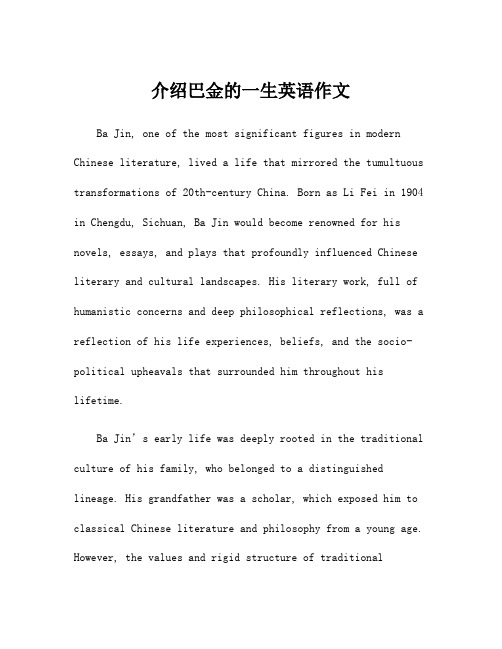
介绍巴金的一生英语作文Ba Jin, one of the most significant figures in modern Chinese literature, lived a life that mirrored the tumultuous transformations of 20th-century China. Born as Li Fei in 1904 in Chengdu, Sichuan, Ba Jin would become renowned for his novels, essays, and plays that profoundly influenced Chinese literary and cultural landscapes. His literary work, full of humanistic concerns and deep philosophical reflections, was a reflection of his life experiences, beliefs, and the socio-political upheavals that surrounded him throughout his lifetime.Ba Jin’s early life was deeply rooted in the traditional culture of his family, who belonged to a distinguished lineage. His grandfather was a scholar, which exposed him to classical Chinese literature and philosophy from a young age. However, the values and rigid structure of traditionalChinese society were soon to clash with his progressive ideas fostered by his exposure to the new thoughts emerging in the early 20th century. In 1916, Ba Jin moved to Shanghai to pursue his studies and was significantly influenced by Western literature and anarchist philosophy.In his early years, Ba Jin developed a keen interest in writing and began to pen his thoughts and observations. This period saw him writing short stories and essays that would later gain recognition. His experiences as a student in Shanghai, where he encountered the hardships faced by the working class, ignited a passion in him for social justice and human rights. This formative period laid the groundwork for his literary career, as he began to question the feudal values that permeated Chinese culture and society.Ba Jin's literary debut came with the publication of his novel "The Family" (1933), which was part of a trilogy that would later include "Spring" and "Autumn." This work wasgroundbreaking as it tackled the themes of familial conflict, the stifling nature of traditional values, and the strugglefor individual freedom. Through the lens of the nuclear family, Ba Jin explored the broader societal issues plaguing China at the time. His characters were often caught in a webof moral dilemmas, reflecting the collective agony of individuals striving for a modern identity amidst the weightof their familial and cultural legacies.The trilogy gained immense popularity, and Ba Jin established himself as a leading voice in the literarycircles. His writing resonated with a generation yearning for change, and he became associated with the May Fourth Movement, a pivotal cultural and intellectual movement that advocatedfor new cultural paradigms and a break from tradition. BaJin's works embraced a modernist narrative style that broke away from classical forms, incorporating stream-of-consciousness techniques and a focus on character psychology.As the political landscape in China began to shift towards totalitarianism, Ba Jin’s literary pursuits did not cease. Amidst this climate of political upheaval, the rise of the Chinese Communist Party (CCP) in the 1940s captivated many intellectuals, including Ba Jin, who saw in it a potential avenue for social change. However, the realities following the establishment of the People’s Republic of China in 1949 soon frustrated him. The oppressive measures taken against dissent and creativity stifled the very freedoms he had long championed in his writings.Ba Jin’s disillusionment was palpable in the subsequent years of his life. He was branded as an intellectual who had to tread carefully, and his work came under scrutiny. Despite the challenges, he continued to write, albeit with a sense of caution, and focused on themes of altruism, humanity, and the struggle for liberation in his later works. His novel "The Last Man" (1955) illustrates the existential despair faced by individuals in an increasingly oppressive society, showcasingthe psychological depth that he was able to achieve throughhis characterization.During the Cultural Revolution (1966-1976), Ba Jin faced persecution as did many artists and intellectuals of his time. His home was raided, and many of his works were denounced or banned. This dark period of his life significantly affectedhis mental well-being and creativity. However, Ba Jinremained resilient, finding solace in the camaraderie offellow writers and artists who shared similar ideologies and sufferings. His correspondence with other literary giants not only preserved his spirit but also allowed him to engage in meaningful discussions about art, literature, and humanrights.Despite the trials he faced, Ba Jin's dedication to literature and social justice never waned. After the Cultural Revolution, he emerged as one of the most vocal advocates for intellectual freedom and the reinvigoration of Chineseliterature. His writings during the late 1970s and 1980s reflected a renewed sense of hope and reconciliation as China began to open up to the outside world. He published his memoirs, which provided insights into his struggles, triumphs, and the evolution of his thoughts throughout his life.Ba Jin's literary contributions extended beyond fiction. He was also a prolific translator and introduced severalworks of Western literature to Chinese audiences, includingthe writings of Tolstoy and Dostoevsky. His translationsoften reflected his anarchist ideologies, advocating for the importance of individual freedom and social justice. This bilingual bridge he created not only enriched Chineseliterature but also initiated conversations about global literature and thoughts within the Chinese literary community.As he aged, Ba Jin continued to receive accolades for his work. He was awarded numerous literary prizes and recognition from prominent literary organizations and institutions, bothin China and internationally. His influence on younger generations of writers and readers was immense, and heinspired a movement that sought to reclaim individual rights and artistic expression in the context of a rapidly modernizing China.Ba Jin passed away on October 17, 2005, at the age of 101, leaving behind a remarkable legacy. His life and work have become a testament to the endurance of the human spirit amid adversity and a call for empathy, justice, and a profound commitment to the ideals of freedom and creativity. Thethemes prevalent in his works continue to resonate today as new generations grapple with their identities and societal responsibilities within a constantly changing landscape.In conclusion, Ba Jin's life was marked by a profound commitment to literary and social ideals. His works captured the tensions between tradition and modernity, personaldesires and familial obligations, individual freedom andsocietal constraints. His legacy endures as a beacon forthose who dare to question the status quo and seek a world where human integrity and creativity can flourish free from oppression. As a towering figure in modern Chinese literature, Ba Jin's contributions will continue to inspire future generations, encouraging them to embrace both their cultural heritage and the modern world’s complexities. Through his profound storytelling and relentless pursuit of truth, Ba Jin has etched his name into the annals of literary history, reminding us all of the power of words to illuminate and transform our understanding of the world.。
巴金简介
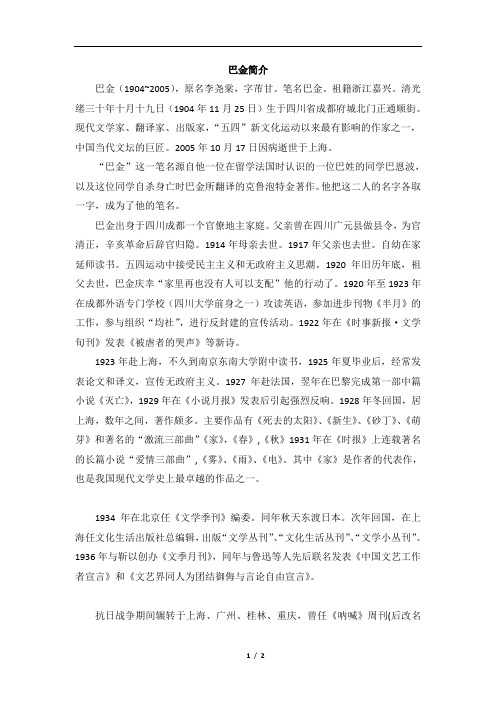
巴金简介巴金(1904~2005),原名李尧棠,字芾甘。
笔名巴金。
祖籍浙江嘉兴。
清光绪三十年十月十九日(1904年11月25日)生于四川省成都府城北门正通顺街。
现代文学家、翻译家、出版家,“五四”新文化运动以来最有影响的作家之一,中国当代文坛的巨匠。
2005年10月17日因病逝世于上海。
“巴金”这一笔名源自他一位在留学法国时认识的一位巴姓的同学巴恩波,以及这位同学自杀身亡时巴金所翻译的克鲁泡特金著作。
他把这二人的名字各取一字,成为了他的笔名。
巴金出身于四川成都一个官僚地主家庭。
父亲曾在四川广元县做县令,为官清正,辛亥革命后辞官归隐。
1914年母亲去世。
1917年父亲也去世。
自幼在家延师读书。
五四运动中接受民主主义和无政府主义思潮。
1920年旧历年底,祖父去世,巴金庆幸“家里再也没有人可以支配”他的行动了。
1920年至1923年在成都外语专门学校(四川大学前身之一)攻读英语,参加进步刊物《半月》的工作,参与组织“均社”,进行反封建的宣传活动。
1922年在《时事新报·文学旬刊》发表《被虐者的哭声》等新诗。
1923年赴上海,不久到南京东南大学附中读书,1925年夏毕业后,经常发表论文和译文,宣传无政府主义。
1927年赴法国,翌年在巴黎完成第一部中篇小说《灭亡》,1929年在《小说月报》发表后引起强烈反响。
1928年冬回国,居上海,数年之间,著作颇多。
主要作品有《死去的太阳》、《新生》、《砂丁》、《萌芽》和著名的“激流三部曲”《家》,《春》,《秋》1931年在《时报》上连载著名的长篇小说“爱情三部曲”,《雾》、《雨》、《电》。
其中《家》是作者的代表作,也是我国现代文学史上最卓越的作品之一。
1934年在北京任《文学季刊》编委。
同年秋天东渡日本。
次年回国,在上海任文化生活出版社总编辑,出版“文学丛刊”、“文化生活丛刊”、“文学小丛刊”。
1936年与靳以创办《文季月刊》,同年与鲁迅等人先后联名发表《中国文艺工作者宣言》和《文艺界同人为团结御侮与言论自由宣言》。
巴金

1、巴金:1904年11月25日出生-2005年10月17日去世。
2、巴金:原名李尧棠,中国四川成都人,祖籍浙江嘉兴。
3、巴金是我国著名现代文学家、出版家、翻译家。
4、巴金被誉为是“五四”新文化运动以来最有影响的作家之一,是20世纪中国杰出的文学大师、中国当代文坛的巨匠。
5、巴金所创作的小说有两大主题:一是探索青年人追求理想和信仰的道路,;二是揭露封建家庭制度的弊害,以影射社会专制制度的罪恶。
6、巴金代表作品:代表作有《新生》、《爱情的三部曲》(《雾》、《雨》、《电》)等,代表作有《春天里的秋天》、《激流三部曲》(《家》、《春》、《秋》)。
7、1949年以后,历任全国文联三、四届副主席,中国作协主席。
8、巴金是《收获》和《上海文学》主编。
9、巴金1982年获意大利“但丁国际奖”,
1983年获法国“荣誉军团勋章”,1984年获香港中文大学荣誉文学博士学位,1985年获美国文学艺术研究院外国院士称号,
10、1990年获日本福冈“亚洲文化奖创设特别奖”,1998年获第四届上海文学艺术奖杰出贡献奖。
繁星(xinr)
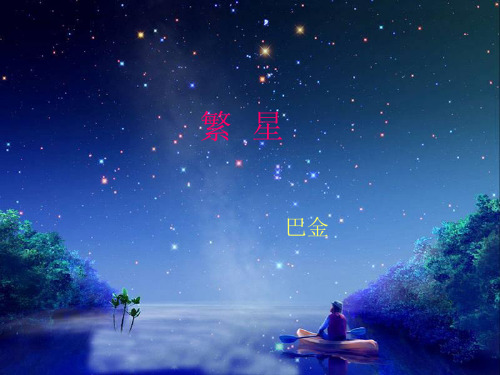
巴金
作者简介
巴金,1904年11月25日出生于四川 成都。祖籍浙江嘉兴。现代著名作家, 杰出的语言大师。原名李尧棠,字芾甘, “巴金”是他的主要笔名。主要作品: 长篇小说《爱情三部曲》(《雾》《雨》 《电》),《激流三部曲》(《家》 《春》《秋》,中篇小说《寒夜》等等。
写作背景
1923年,19岁地巴金和三哥毅然冲 破家庭地樊笼到了上海、南京,考入东 南大学附中补习班,学习期间参加了一 些社会活动,他的民主思想得到进一步 发展。1927年1月15日,他乘法国邮船 “昂热”号离沪赴法,在邮船航行期间, 巴金撰写了《海行杂记》38则。《繁星》 是其中的一篇游记,写于1927年1月。
• 在我的房间外面,有一段没有被屋瓦遮掩的蓝天。 我抬头可以望见嵌在天幕上的几颗明星。我常常 出神地凝视着那些美丽的星星。它们象一个人的 眼睛,带着深深的关心望着我,从不厌倦。这些 眼睛每一霎动,就像赐予我一次祝福。
• 在我的天空里星星是不会坠落的。想到这,我的 眼睛也湿了。
联想和想象。
•
联想,就是由一事物想到另一事物的心理过程。用朱光潜的话
说,“联想就是见到甲想到乙”。
•
想象,就是在原有感性形象的基础上创造出新形象的过程。黑
格尔说:“想象是创造的。最杰出的艺术本领就是想象。”
• 比喻、拟人和排比等修辞手法的综合运用
拓展阅读
•星
里,我无意间见到这样的句子:“星星,
无上的安慰。
•
在上海一个小小舞台上,我看见了屠格涅夫笔下的德国音乐家老
伦蒙。他或者坐在钢琴前面,将最高贵的感情寄托在音乐中,呈献给
一个人;或者立在蓝天底下,摇动他那白发飘飘的头,用赞叹的调子
说着:“你这美丽的星星,你这纯洁的星星。”望着蓝空里眼瞳似的
